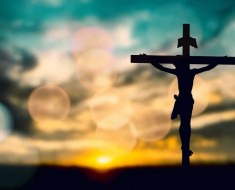Some bloodthirsty prophesies there of how the nations that mistreat Judea are going to be punished. A totally sectarian view of the world and the future; and of God! Narrow and held tight together. Us lot and God. But then there comes this endearing botanical picture of a great tree planted on a mountain giving shelter to all the creatures of the air.
The tree again in the reading from Mark’s gospel. Like any seed, tiny but then growing to become big and welcoming so that it becomes an image of the Kingdom of God, which like birds nesting in the branches of a tree, gives hospitality to all people.
. There’s a development of the idea in the book of Revelation –‘the angel showed me the river of the water of life, as clear as crystal, on each side of the river stood the tree of life, bearing twelve crops of fruit, yielding its fruit every month. And the leaves of the tree are for the healing of thenations.» (Revelation 22:1-2). The ‘tree of life’ has become an image in piety and art.
No wonder tree-hugging has become popular amongst environmentalists.
It’s a strong word associated with pastoral responsibility. Catholic priests are called Father, men who by obedience to their church vows, will never have children of their own. The priest is seen as the head of a church family, everyone of whatever age calling him by that name. And of course for Catholics the Pope is the father supreme – Papa.
It can be a word associated with authority. ‘You wait until I tell your father what you’ve been doing’ when he comes home’. It has been used to define a nation. ‘The Fatherland’ has an ugly feel to it for those of us who lived through the rise of Germany in the 1930’s. Adolf Hitler was called ‘the Fuehrer’ as if he embodied the nation’s life in his own person. There are better ways of defining a country, even our odd one with an inherited monarch at the centre and some sort of Christian tradition. There was a survey earlier in the year about the number of British children who don’t know the ‘Lord’s Prayer’. It’s sad because the prayer has been unifying, something all of us can do, binding the nation. It’s a community prayer. It gathers us into a confederacy of faith. Amongst a collection of people you may never have met before or are likely to meet again, we become a notional family just by saying ’Our Father’.
And what of the man who taught it ? Jesus had this unique sense of God as primarily his father but ours as well. It’s the word Jesus uses and the relationship which he proposes of an only son and his father – almost an exclusive relationship. Jesus speaks of his heavenly father with immense affection – was his own father a model of that or did he perhaps lack a father’s love? One reason why Joseph is in the background?. Another unknown.
But we inherit that prime name for God – OUR father. When you pray, says Jesus, you can borrow my name for God. This need we have to find big clues to what God is really like, and of all the many images available, and the old and new testaments have a go at many of them and we met the evocative symbol of trees and their sheltering branches, but here is this simple deep image of a child and his Dad. It tells us a lot about God but also about Jesus. That revealing moment when the resurrected Jesus says to his friends, ‘don’t hold me; I am not yet with my father’. Jesus, on his way to going home.
So God bless the Dads. The ones who have children but as well, the Dad’s who looked after us – suffered us – when we were children. May they be good ones, caring for their children, or as they get old cared for by their children. Good husbands, recognising that many of us have a lot to learn and unlearn about how to contribute to the wellbeing of our families and the wider community we all belong to. Many of us having a lot to learn about the job, and where better to learn than from the mothers?
Mothers. They were bound to get in on the act in the end! Parental partnership is what matters : unity and understanding within the family, and this precious idea we hold to, that religion is a relationship with the divine and with each other. Which brings us to the family meal we are sharing in this morning.
There is evidence that in the first centuries of the church’s history, this wasn’t a service in church but a genuine nosh up. At first the meal was shared in people’s homes – it was a family meal. It became sacramental when the church fathers took over and the right bread had to be used and the correct wine instead of chunky bread made from spelt and rye and local wine from the grapes of the fields. Right up to the ninth century apparently it was still so – often the congregation themselves bringing food for the communion – out of their pantries and cellars, a little like we do, bread rolls that can be bought at any shop.. But, then gradually the church took over and special white wafers of unleavened bread became the elements of grace. Normality, and rootedness was lost a bit perhaps, but the idea of a spiritual family – God’s adopted family -remains .
The family celebrating its new life in Christ at table fellowship, as we do this morning.





